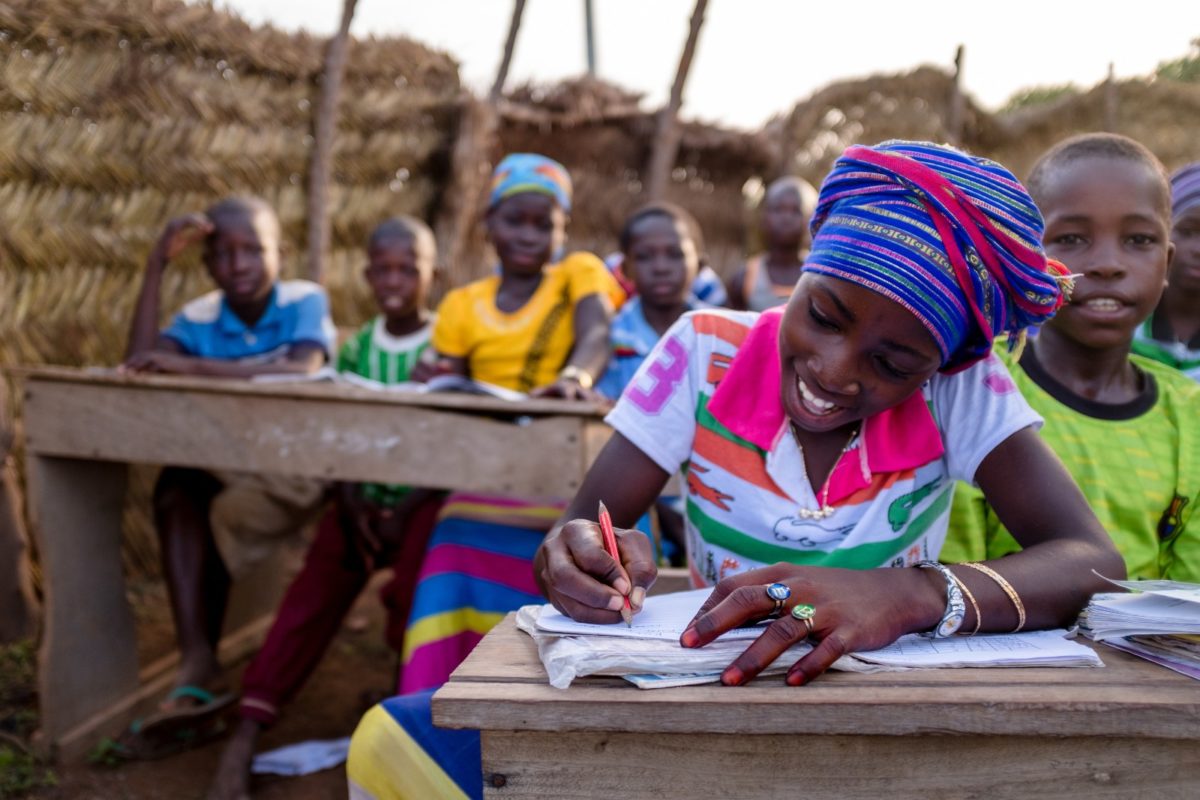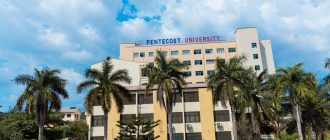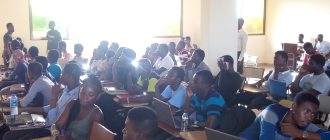Diploma In General Drilling
This is a two year (4-semester)programmerun by the Department of Geological Engineering. The programme aims at addressing the needs of middle level personnel in drilling for mineral/oil exploration, geotechnical and hydrogeological establishments. The successful candidate should be competent to take up jobs in the mining, oil, hydrogeological and allied industries and be able to design, operate, work in a team and supervise drilling operations under all conditions as well as have knowledge in using modern drilling equipment.
|
|
|
|
YEAR ONE SEMESTER ONE | ||||
| Course No. | Subject | T | P | C |
| GL 121 GL 123 GL 125 GL 127 GL 129 GL 131 GL 133 GL 135 GL 137 | Trigonometry and Calculus Physical and Structural Geology Land Surveying Technical and Engineering Drawing Internal Combustion Engine Exploratory Drilling and Safety Basic French 1 Communication Skills Field Trip – Reverse Circulation Drilling | 2 2 2 1 1 2 1 2 0 | 2 1 2 3 3 4 1 1 1 | 3 2 3 2 2 3 1 2 1 |
Totals | 13 | 18 | 19 | |
YEAR ONE SEMESTER TWO | ||||
| Course No. | Subject | T | P | C |
| GL 122 GL 124 GL 126 GL 128 GL 130 GL 132 GL 134 GL 136 GL 138 CE 172 CE 172 CE 172 | Statistics & Probability Strength of Materials Mineralogy and Petrology Introduction to Computing Hydraulic Systems Water Well Drilling Technical Report Writing Basic French II Field Trip – Water Well Drilling Programming in C++ Programming in C++ Programming in C++ | 2 2 2 2 2 2 2 1 0 1 1 1 | 1 1 2 1 2 1 1 1 1 1 1 1 | 2 2 3 2 3 2 2 1 1 1 1 1 |
Totals | 15 | 11 | 18 |
YEAR TWO SEMESTER ONE | ||||
| Course No. | Subject | T | P | C |
| GL 221 GL 223 GL 225 GL 227 GL 229 GL 231 GL 233 GL 235 GL 237 | Percussive Drilling Rig Maintenance Pneumatics Literature in English Elements of Mining and Rock Fragmentation Hydrogeology Basic Electricity Entrepreneurial Skills Field Trip – Core Drilling | 2 2 2 1 2 2 2 2 0 | 1 3 1 0 2 1 1 1 1 | 2 3 2 1 3 2 2 2 1 |
Totals | 15 | 11 | 18 | |
YEAR TWO SEMESTER TWO | ||||
| Course No. | Subject | T | P | C |
| GL 222 GL 224 GL 226 GL 228 GL 230 GL 232 GL 234 GL 236 | Rock and Soil Mechanics Orientation Drilling Project Work Rock and Mineral Deposits ofGhana Seminar Managerial Skills Environmental Management Training on Oil Rig | 2 1 1 2 1 2 2 1 | 2 3 8 2 2 1 1 1 | 3 2 3 3 2 2 2 1 |
Totals | 12 | 21 | 18 |
YEAR ONE SEMESTER ONE
GL 121 Trigonometry and Calculus (2, 2, 3)
Trigonometry
Introduction: The general angle; the trigonometrical ratios of angles of any magnitude; trigonometrical ratios of 30º, 45º, 60º; Graphs of , ,
Trigonometrical identities: the formulae for , , ; the double angle formulae; the factor formulae; the Sine rule, the Cosine rule, area of triangle, radians, solving trigonometrical equations.
Calculus
Limits; differentiation of a composite function; implicit differentiation; maxima and minima; integration as the inverse of differentiation; application of integration to: trigonometry, polynomials, and exponential functions, areas and volumes; Integration techniques: integration by substitution, by parts and by resolution into partial fractions.
GL 123 Physical and Structural Geology (2, 1, 2)
Various disciplines in geology. The rock cycle, strata and geological time scale. Internal structure of the earth, the solar system, plate tectonics, weathering, soils, mass wasting.
Primary and secondary structures: bedding; cross bedding; graded bedding, ripple marks; desiccation cracks, sole marking, pillow lavas load cast; unconformities, folds, joints, faults, cleavages and schistosities.
GL 125 Land Surveying (2, 2, 3)
General surveying procedures and operations. Compass surveying and application in horizontal distance measurements and obstacles in chaining. Vertical control (levelling) and applications. Theodolite and applications. Traversing and computation. Modern positioning systems (electronic and satellite). Setting out and orientation of drill hole positions.
GL 127 Technical and Engineering Drawing (1, 3, 2)
Construction of lines, angles, regular polygons and general loci, first and third angle orthogonal projections. Sectional views and standard conventions of sectional views. Curves of intersections of various planes and solids, development of various solids like cylinders and spheres.
GL 129 Internal Combustion Engines (1, 3, 2)
Engine calculations. Energy conversion process. Fuel injection equipment. Fault finding – loss of power, engine knocks, diesel knock, detonation, warning, devices, fault, causes, remedies. Cooling System – liquid cooling, air cooling, thermosiphon, cooling, pressurised pump-assisted cooling, thermostats. Lubrication System. Power chart.
Internal Combustion Engines – cylinder compression test, cylinder leakage test, calibration and phasing test, exhaust gas analysis.
GL 131 Exploratory Drilling (2, 4, 3)
History of drilling, principles of drilling, drilling methods, main uses of diamond drill, general description of diamond drill, mechanical features of a diamond drill, core care and handling.
Drill tools and accessories: diamond bits, reaming shell, core barrels, rods, casings, pump, overburden, drill techniques, fluids for mud application, vibration, borehole deviation and survey.
GL 133 Basic French I (1, 1, 1)
Etablir l’Identité de quelqu’un. Entrer en contact avec le monde francophone. Savoir décrire les activités et les situer dans le temps. Savoir décrire sa famille et les liens familiaux. Etudier la santé et les sports.
GL 135 Communication Skills (2, 1, 2)
Introduction to communication. Communication in organisations. Listening skills. Note-taking and note-making. Reading skills. Writing skills. Avoiding common grammatical errors.
GL 137 Field Trip – Reverse Circulation Drilling (0, 1, 1)
Field trip to reverse circulation drilling operation: students will be expected to present reports to be assessed for credits.
YEAR ONE SEMESTER TWO
GL 122 Statistics and Probability (2, 1, 2)
Collection of data, descriptive analysis of data. Numerical descriptive measures – measures of central tendency, the mean, median and mode. Measures of dispersion – the range, the mean, deviation, the variance or standard deviation, the coefficient of variation, measurement of positions and shapes.
Events, sample space, definition of measure of probability of events, conditional probability and independent events, some basic laws and rules in probability, Bayes’ theorem, permutation and combination, probability distribution.
GL 124 Strength of Materials (2, 1, 2)
Mechanical properties of materials, simple stresses, temperature stresses, shear stresses, torsional shear stresses, beams; shear force and bending moments, bending stress in beams deflection beams, complex stresses, two dimensional stress, Mohr’s stress circle.
GL 126 Mineralogy and Petrology (2, 2, 3)
Crystallography: formation, classification, description of crystals; seven crystal systems, stereographic projections, twinned crystals. Physical properties of minerals.
Classification of minerals. Mineral Chemistry. Polymorphism, pseudomorphism, noncrystalline minerals.
Sedimentary rock formation, composition, classification, textures and description. Igneous Rock formation, composition, structures, textures and description. Metamorphic Rocks: factors and types of metamorphism, metamorphic zones and facies. Textures and structures. Classification, description and study of important metamorphic rocks.
GL 128 Introduction to Computing (2, 1, 2)
Introduction to computers, windows operating system, internet usage, word processing using MS word, spreadsheet using MS excel.
GL 130 Hydraulic Systems (2, 2, 3)
Basic principles of hydraulics (hydrostatic and hydrodynamics), properties of hydraulic fluids, filters and filtration, hydraulic pumps (construction, sizing and selection), control of hydraulic systems, actuators (linear and rotary), hydraulic reservoirs and accumulators, seals and packing, hydraulic pipes, hoses, and fittings, basic hydraulic circuits; hydraulic system maintenances, repairs and reconditioning.
GL 132 Water Well Drilling (2, 1, 2)
Well types, well drilling methods, environmental consideration, siting of drill holes, casings, methods and techniques of water well development, problems associated with water well supplies, types of hand pumps, preparation of concrete pad, design of screen types for basement formation, water level testing, mechanised borehole.
GL 134 Technical Report Writing and Presentations (2, 1, 2,)
Elements of technical writing. Writing of curriculum vitae (CV), minutes and reports. Career skills. Email communication. Presentation skills.
GL 136 Basic French II (1, 1, 1)
Les déplacements (I). Les déplacements (II). Les achats. Etudier la vie universitaire. Etudier l’art culinaire.
GL 138 Field Trip – Water Well Drilling (0, 1, 1)
Field trip to water well drilling operation. Students will be expected to present reports upon which they will be assessed for their credits.
YEAR TWO SEMESTER ONE
GL 221 Percussive Rock Drilling (2, 1, 2)
Introduction to rotary air blast drilling. Tools for rotary drilling, hydraulic rock drills: top hammer and DTH, pneumatic rock drills, principle of percussive drilling, setting parameters, and production drilling.
GL 223 Rig Maintenance (2, 3, 3)
Fault finding/inspection, diagnoses before repairs, minor repairs, major repairs, top overhaul, decarbonising and valve grinding, engine washing equipment, washing chemicals, engine, dismantling procedures, engine reconditioning, use of liners, wet liners installation procedures, dry liners installation and equipment, engine crankshaft reconditioning.
GL 225 Pneumatics (2, 1, 2)
Basic Thermodynamics, First Law and Second Law, non-flow and flow equations, application to closed and open systems, types of compressors; (reciprocating rotary, centrifugal and axial) drivers; accessories; lubrication system; control valves; actuators; piping, hoses and fittings; air tools; air filters and water separators; selection and siting compressors; air distribution system; safety and maintenance.
GL 227 Literature in English (1, 0, 1)
Introduction to literature. Analysis, interpretation and appreciation of literature: prose, drama and poetry. Selected texts (African and non-African classics).
GL 229 Elements of Mining and Rock Fragmentation (2, 2, 3)
Basic introduction to underground and surface mining terminologies: description of various operations in underground and surface mining – drilling, blasting, mucking, supporting, stoping, ventilation, benching, stripping, reclamation, including technology and equipment. Introduction to underground and surface mining methods; elements of mine ventilation; Sampling and resource evaluation; materials handling equipment; explosives – types of explosives, their properties and areas of use. Methods of ground fragmentation: drilling and blasting, environmental impact of mining.
GL 231 Hydrogeology (2, 1, 2)
The Hydrologic Cycle: precipitation, evaporation, runoff and stream flow measurements.
Properties of aquifers: porosity and permeability of various types of rocks. Groundwater recharge: hydrologic horizons, condensation theory, infiltration theory, aquifer types and properties, groundwater dynamics, hydraulic head, hydraulic gradient, Darcy’s law, hydraulic conductivity, flow lines and equipotential lines Well installation, drilling methods, well design, well development and aquifer tests
GL 233 Basic Electricity (2, 1, 2)
Circuit laws. Electrostatics and capacitance. Electromagnetism. Magnetic Circuits. Alternating Voltage and Current.
GL 235 Entrepreneurial Skills (2, 1, 2)
Introduction toBusinessEntrepreneurship: Forms ofbusinessownership. Financial management. Insurance. Industrial relations and Labour relations.
GL 237 Field Trip – Core Drilling (0, 1, 1)
Field trip to Core Drilling Operation: students will be expected to present reports upon which they will be assessed for their credits.
YEAR TWO SEMESTER TWO
GL 222 Rock and Soil Mechanics (2, 2, 3)
Scope of rock mechanics. Rock strength and deformability. Engineering rock mass classification. Excavation support systems. Determination of moisture content, density, porosity, RQD and UCS. Origin and classification of soils. Phase relationships. Permeability of soils. Compaction of soils. Site investigation. Determination of moisture content, Atterberg limits. Particle size analysis, soil density, constant and falling head permeability.
GL 224 Orientation Drilling (1, 3, 2)
Mechanical hole making methods, cable tool drill string components, types of cable drill rigs, rotary drilling, auger drilling, prime movers, cable tool operation.
GL 226 Project Work (1, 8, 3)
Data obtained either during the previous industrial attachment or from elsewhere is processed and analysed/interpreted and presented as project work.
GL 228 Rock and Mineral Deposits of Ghana (2, 2, 3)
Processes of formation of mineral deposits. Magmatic concentration of deposits. Alteration, hydrothermal and replacement deposits. Sedimentary and residual deposits and supergene enrichment. Mineral fuels and traps. Industrial Mineral formation and properties. Classification of the various non-metallics and aggregates in Ghana.
Statigraphy of the Birimian. Proterozoic ganitoids. Distribution, origin of gold, manganese, etc. in the Birimain and Tarkwaian. Dahomeyan, Togo, Buem and Voltaian Systems. Accraian and Sekondian Series.
GL 230 Seminar (1, 3, 2)
Students are either given current topics on drilling operations or are made to discuss and present an update of their project works at a forum.
GL 232 Managerial Skills (2, 1, 2)
Introduction to management. Planning and organising. Case studies to demonstrate the concept of management in industry.
GL 234 Training on Oil Rig (1, 1, 1)
Components of oil rigs, oil drilling techniques, overview of site preparation and drilling, removal of drill pipe, casing, dangers of oil drilling, safety measures at drilling site, technical services, oil spills and environmental concerns.
GL 236 Environmental Management (2, 1, 2)
Waste generation, land pollution, air and water pollution, noise pollution, green house effect, ozone depletion, solid waste management, water resource management, land rehabilitation.



